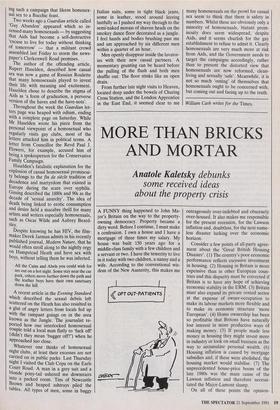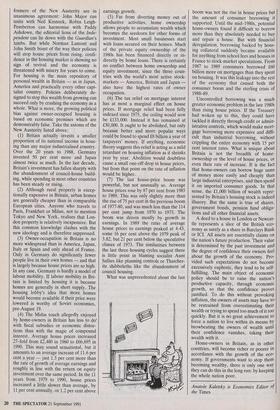MORE THAN BRICKS AND MORTAR
Anatole Kaletsky debunks
some received ideas about the property crisis
A FUNNY thing happened to John Ma- jor's Britain on the way to the property- owning democracy. Property became a dirty word. Before I continue, I must make a confession. I own a house and I have a mortgage of three times my salary. My house was built 150 years ago for a middle-class family with a few children and a servant or two. I have the temerity to live in it today with two children, a nanny and a wife. According to the conventional wis- dom of the New Austerity, this makes me outrageously over-indebted and obscenely over-housed. It also makes me responsible for the present recession, for the Lawson inflation and, doubtless, for the next name- less disaster lurking over the economic horizon.
Consider a few points of all-party agree- ment about the 'Great British Housing Disaster'. (1) The country's poor economic performance reflects excessive investment in housing. (2) Housing in Britain is more expensive than in other European coun- tries and this disparity must be corrected if Britain is to have any hope of achieving economic stability in the ERM. (3) Britain must also expand its private rented sector at the expense of owner-occupation to make its labour markets more flexible and to make its economic structure 'more European'. (4) Home ownership has been so profitable that Britons have naturally lost interest in more productive ways of making money. (5) If people made less money in housing they might invest more in industry or look on small business as the way to accumulate personal wealth. (6) Housing inflation is caused by mortgage subsidies and, if these were abolished, the housing market would stabilise. (7) The unprecedented house-price boom of the late 1980s was the main cause of the Lawson inflation and therefore necessi- tated the Major-Lamont slump.
On all of these points the opinion- formers of the New Austerity are in unanimous agreement: John Major can unite with Neil Kinnock, Robin Leigh- Pemberton can harmonise with Paddy Ashdown, the editorial lions of the Inde- pendent can lie down with the Guardian's lambs. But while Norman Lamont and John Smith boast of the way their policies will stop house prices from rising, confi- dence in the housing market is showing no sign of revival and the economy is threatened with misery for years to come. For housing is the main repository of personal wealth in Britain — as in Japan, America and practically every other capi- talist country. Policies deliberately de- signed to stop this wealth from growing can succeed only by crushing the economy as a whole. What is more, the growing political bias against owner-occupied housing is based on economic premises which are demonstrably false. Take the axioms of the New Austerity listed above: (1) Britain actually invests a smaller proportion of its national income in hous- ing than any major industrialised country. Over the 20 years to 1988, Germany invested 50 per cent more and Japan almost twice as much. In the last decade, Britain's investment has fallen sharply with the abandonment of council-house build- ing, while spending in most other countries has been steady or rising.
(2) Although rural property is excep- tionally expensive in Britain, urban homes are generally cheaper than in comparable European cities. Anyone who travels to Paris, Frankfurt or Milan, not to mention Tokyo and New York, realises that Lon- don property is relatively inexpensive. But this common knowledge clashes with the new ideology and is therefore suppressed.
(3) Owner-occupation in Britain is no more widespread than in America, Japan, Italy or Spain and only ahead of France. Only in Germany do significantly fewer people live in their own homes — and that is largely because house prices are so high. In any case, Germany is hardly a model of labour mobility. If labour mobility in Bri- tain is limited by housing it is because homes are generally in short supply. The housing lobby's idea that More homes would become available if their price were lowered is worthy of Soviet economics, pre-August 19.
(4) The Midas touch allegedly enjoyed by home-owners in Britain has less to do' with fiscal subsidies or economic distor- tions than with the magic of compound interest. Average house prices increased 27-fold from £2,480 in 1960 to £66,695 in 1990. This may sound sensational, but it amounts to an average increase of 11.6 per cent a year — just 1.5 per cent more than the rate of growth of average earnings and roughly in line with the return on equity investment over the same period. In the 11 years from 1979 to 1990, house prices increased a little slower than average, by 11 per cent annually, or 1.2 per cent above earnings growth.
(5) Far from diverting money out of productive activities, home ownership allows people to accumulate wealth which becomes the seedcorn for other forms of investment. Most small businesses start with loans secured on their houses. Much of the private equity ownership of the 1980s has been financed directly or in- directly by home loans. There is certainly no conflict between home ownership and equity investment, since the three coun- tries with the world's most active stock- markets — America, Britain and Japan also have the highest rates of owner occupation.
(6) The tax relief on mortgage interest has at most a marginal effect on house prices. If mortgage relief had been fully indexed since 1975, the ceiling would now be £133,000. Instead it has remained at £30,000. It ought to be abolished, but only because better and more popular ways could be found to spend £8 billion a year of taxpayers' money. If anything, economic theory suggests this relief is acting as a mild retardant on housing inflation as if shrinks year by year. Abolition would doubtless cause a small one-off drop in house prices, but from that point on the rate of inflation would be higher.
(7) The last house-price boom was powerful, but not unusually so. Average house prices rose by 87 per cent from 1985 to 1989. This was only slightly more than the rise of 75 per cent in the previous boom of 1977-80, and was much less than the 114 per cent jump from 1970 to 1973. The boom was driven mostly by growth in earnings. In 1989 the ratio of average house prices to earnings peaked at 4.43, some 16 per cent above the 1979 peak of 3.82, but 21 per cent below the speculative climax of 1973. The similarities between the last three housing cycles suggest there is little point in blaming socialist Aunt Sallies like planning controls or Thatcher- ite shibboleths like the abandonment of council housing.
What was unprecedented about the last boom was not the rise in house prices but the amount of consumer borrowing it supported. Until the mid-4980s, potential home-owners found it difficult to borrow more than they absolutely needed to buy and repair a house. But with financial deregulation, borrowing backed by hous- ing collateral suddenly became available for anything from school fees and houses in France to stock-market speculations. From 1987 to 1989 consumers borrowed £60 billion more on mortgages than they spent on housing. It was this leakage into the rest of the economy that caused both the consumer boom and the sterling crisis of 1988-89.
Uncontrolled borrowing was a much greater economic problem in the late 1980s than rising house prices. If the Treasury had woken up to this, they could have tackled it directly through credit or admin- istrative controls, which would make mort- gage borrowing more expensive and diffi- cult than industrial borrowing, without crippling the entire economy with 15 per cent interest rates. What is unique about Britain is not the breadth of home- ownership or the level of house prices, or even their rate of increase. It is the fact that home-owners can borrow huge sums of money more easily and cheaply than large industrial enterprises, and then spend it on imported consumer goods. In that sense, the £1,000 billion of wealth repre- sented by Britain's housing stock is indeed illusory. But the same is true of shares, government bonds, pension fund obliga- tions and all other financial assets.
A deed to a house in London or Newcas- tle represents a slice of the British eco- nomy as surely as a share in Barclays Bank or ICI. All assets are essentially claims on the nation's future production. Their value is determined by the past investment and the degree of confidence their owners feel about the growth of the economy. Pro- vided such expectations do not become excessively euphoric, they tend to be self- fulfilling. The main object of economic policy should be to raise the nation's productive capacity, through economic growth, so that the confidence proves justified. To do this without provoking inflation, the owners of assets may have to- be restrained from overestimating their wealth or trying to spend too much of it too quickly. But it is no great achievement to force a nation to live within its means by browbeating the owners of wealth until their confidence vanishes, taking their wealth with it.
Home-owners in Britain, as in other countries, will become richer or poorer in accordance with the growth of the eco- nomy. If governments want to stop them becoming wealthy, there is only one way they can do this in the long run: by keeping the whole nation poor.
Anatole Kaletsky is Economics Editor of the Times



























































 Previous page
Previous page